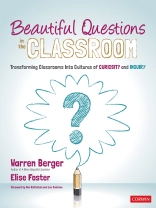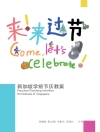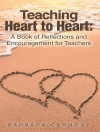’What does it mean to learn? Most of us eventually realize that genuine learning is less about delivering the right answers and more about asking the right questions. In an age of automation, questioning is a uniquely human skill, one we should foster in school and in life. This book is an essential read for educators at every level.’
— Daniel H. Pink, author of ‘WHEN’, ‘DRIVE’, and ‘A Whole New Mind’
‘For teachers around the world there is a moral urgency to work with young learners in innovative ways that nurture agency, curiosity, agile thinking and problem solving. The role of questions in this cannot be underestimated.’
— Kath Murdoch. Consultant in Education and Author of ‘The Power of Inquiry.’
Why does engagement plummet as learners advance in school? Why does the stream of questions from curious toddlers slow to a trickle as they become teenagers? Most importantly, what can teachers and schools do to reverse this trend? Beautiful Questions in the Classroom has the answers. This inspirational book from Warren Berger and Elise Foster will help educators transform their classrooms into cultures of curiosity. The book explores the importance of questioning and how inquiry leads to learning, innovation, and personal growth.
Readers will find:
— Strategies to inspire bigger, more beautiful student questions
— Techniques to help educators ask more beautiful questions
— Real-world examples, case studies, practical ideas, and question stems
— Videos showing strategies at work
Great teachers help students to ask bigger, more beautiful questions. This book will prepare and inspire educators to develop a powerful teaching approach that creates a classroom full of student driven inquiry.
Содержание
Publisher’s Acknowledgments
About the Authors
Foreword
Introduction
Chapter 1. Why Questioning Matters Now More Than Ever
What This Means for Students and Their Teachers
Critical Thinking Is Even More Critical Now
Questions Give Humans an Edge Over Technology
Producing Future Leaders
Chapter 2. What Discourages Student Questioning?
The Decline of Kids’ Questions
The Five Enemies of Classroom Questioning
Chapter 3. Model the Behavior
Become a “Beautiful Questioner”
Start With Why
Become a Student of Your Own Work
Adopt a “Beginner’s Mind”
Be Curious in the Classroom
Chapter 4. Create a Culture of Inquiry in the Classroom
Foster an Appreciation of Questioning
Create a Stimulating Environment for Questioning
Make It Safe to Question
Make Questioning a Team Sport
Provide a Basic Questioning “Starter Kit”
Reward and Celebrate Questioning
Chapter 5. Inspire and Activate Student Questions
Provoke Curiosity
See Think Wonder
Release the Questions!
The Question Formulation Technique
The Origins of the QFT
Learning to Use the QFT in Classrooms
The Question Focus
The Question Generation Stage
Chapter 6. Help Students Improve and Take Ownership of Their Questions
Improve the Questions That Have Been Generated
Other Ways to Improve Questions
Evaluate and Prioritize Questions
Reflect on What Has Been Learned
Take Ownership of Questions
Turn Questions Into Projects
Help Students Find Their Own, Personal Big Beautiful Questions
Chapter 7. Be a Questioning Leader (in Your School, Community, and the World)
Ask Questions That Clarify
Ask Questions That Help You Rethink and Reinvent
Ask Questions That Help You Help Others
Ask Questions That Can Help You Enact Change
Taking Action
References
Resources
Index
Об авторе
Elise Foster is a leadership coach who enables education and industry leaders to tap into capability and unlock potential inside their organizations. She has conducted significant research in the field of leadership within education systems and is coauthor of The Multiplier Effect: Tapping the Genius Inside Our Schools. She has a deep passion for helping leaders become better equipped to navigate the increasingly complex demands of work and life. She works with leaders to make lasting change, by uncovering and making sense of the underlying beliefs preventing them from fully realizing their personal leadership vision. She has found that often, if not always, curiosity and the art of asking questions are central to making progress in the areas of leadership, innovation, and change. Elise has had the privilege of sharing the research and ideas behind multiplier leadership with school leaders at national conferences, such as the conference of the National Association of Elementary School Principals; local districts, including Gwinnett County Public Schools and Chicago Public Schools; and universities, including the Harvard Graduate School of Education and Arizona State University. When she is not working with education or industry leaders, she delights in learning alongside her school-age daughter and her daughter’s classmates as a classroom volunteer and Girl Scout leader. She has taught and coached students at Indiana University (Kelley School of Business) and as a management fellow at Harvard University. She holds bachelor’s and master’s degrees in engineering from Virginia Tech and a master’s in education from Harvard University.












